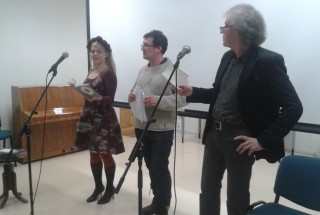BLOG
LATEST NEWS
It's never too late to translate
15.11.2013

"Translating is not only putting texts into another language in the hope of having them printed as books", said Finnish poet Heli Laaksonen in Poetry Ride's poetry in dialect- themed event in Tartu main library. "When you really get to know somebody else's thoughts, it inspires you to do things you might not otherwise have done." Laaksonen performed in the event together with Contra and Jan Rahman from Estonia and Guntars Godiņš from Latvia, all of whom have a close and warm relationship with dialects.
Heli Laaksonen spoke about her her meeting and translating the Estonian poet Jan Rahman had changed her views on writing and inspired her to write in her own language, the south-western Finnish dialect. The public was lucky to witness the translation process live on stage as Rahman translated a poem from Laaksonen's new book Aapine. Which, by the way, is a nominee for Finlandia junior, the most prestigious award in children's literature in Finland. Seeing and hearing a translation being born was a thought-provoking experience, as translating is usually done in writer's chamber, away from the public eye. Now we could not only witness it, but some members of the public were participating in the process as well. As the event was part of a seminar of Southern Estonian literature organised by the University of Tartu, there were a lot of experts of dialects present.
Laaksonen's collection in Latvian, Kad gos smei, has become a phenomenon. It is not so very common for a book of poetry – translated poetry especially – to have already 3 prints sold out. Laaksonen was one of the very first poetry riders in 2006, and Guntars Godiņš got to know her works during the festival. Poems written in the language of the Finnish coastside found their new home in the Salacgriva dialect. Maybe it is the proximity of the sea that connects these two dialects? The translation simmered in slow but steady fire for some time, and Kad gos smei saw the light off day in November 2012. It is often asked how it is possible to translate literature written in dialect. "How is it possible to translate", is a question that Heli Laaksonen asks back. Literature written in dialect needs to be translated into dialect, as the official, so-called "right" way of speaking has a different point of view. The words of dialect and official way oof speaking are not interchangeable; however, you can of course describe the same things with both. Sometimes you just might need a bit more words.








Leave a comment